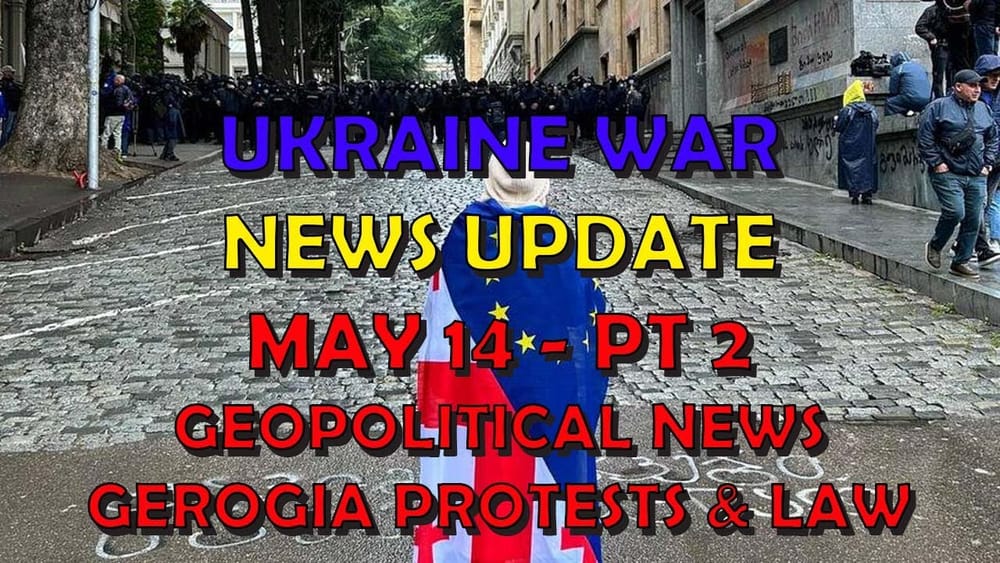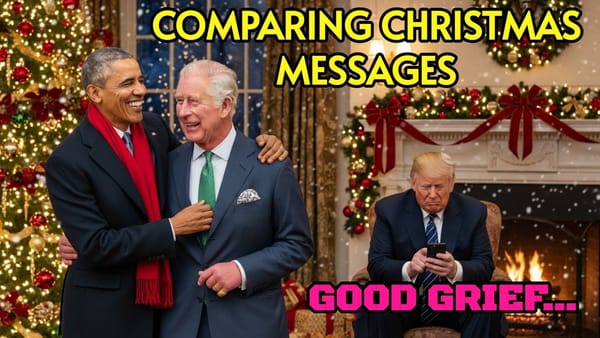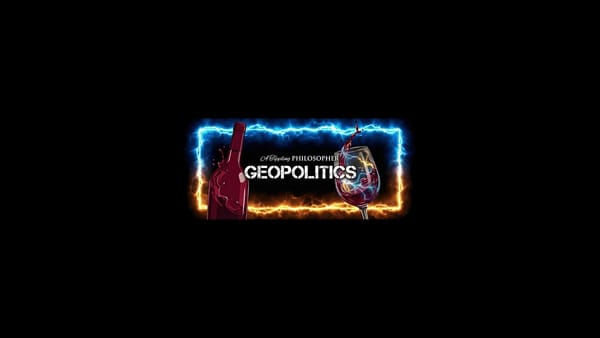Ukraine War Update NEWS: Geopolitics News
Table of Contents 📖
Hello Team
🎦 00:00-00:17⏩
Jonathan welcomes viewers to another ATP Geopolitics update, the third part of the Ukraine War news for May 14th, 2024, focusing on geopolitics.
Return to top⤴️
UK Reassurances on Ukraine Support Amidst Cameron-Trump Peace Plan Reports
🎦 00:18-04:25⏩
- The UK government has reaffirmed its support for Ukraine following media reports about former Prime Minister David Cameron allegedly proposing a peace plan to US Presidential candidate Donald Trump.
- The alleged peace plan, as reported by sources, involved ensuring Ukraine maintains its current front lines with substantial aid, creating favorable conditions for Trump to mediate a peace deal upon assuming office.
- While the UK government has denied the reports, Defense Secretary Grant Schapps emphasized the UK's commitment to supporting Ukraine and not pressuring them into an unfavorable peace treaty involving territorial losses.
- Jonathan analyzes Cameron's potential motivations, suggesting it might be a strategic move to appeal to Trump's desire for a peace deal. By ensuring Ukraine is in a strong position with sufficient aid, it could incentivize them to negotiate, ultimately benefiting Trump's image.
Security Pacts and Potential Troop Deployments to Ukraine
🎦 04:25-05:06⏩
- Jonathan lists countries negotiating security agreements with Ukraine (Norway, Belgium, USA, EU, and Luxembourg), indicating growing international support beyond military aid.
- He highlights ongoing discussions among partner nations, including France, Estonia, Latvia, Lithuania, Netherlands, Poland, Norway, Czech Republic, Finland, and Canada, regarding the potential deployment of military contingents to Ukraine.
Poland's Increased Intelligence Budget and Moldova's EU Security Pact
🎦 05:06-06:42⏩
- Poland's Prime Minister, Donald Tusk, announced an allocation of over 25 million dollars to bolster the country's intelligence services in response to the escalating threat from Russia. This move comes as Poland emerges as a crucial distribution hub for aid to Ukraine.
- Moldova and the EU are preparing to sign a security pact within the next week. The agreement aims to significantly enhance defense cooperation between Moldova and the EU. This is particularly crucial for Moldova, given its vulnerability to Russian interference, especially with an upcoming election.
Russian Disinformation and Cyberwarfare
🎦 06:42-08:48⏩
- Jonathan discusses Russia's increasing use of disinformation and cyberwarfare, highlighting the global nature of these tactics.
- He cites a Guardian article reporting on the head of GCHQ’s warning about Russia directing hackers to target the UK and other Western nations.
- Jonathan emphasizes the growing concern over the links between Russian intelligence services and criminal hacker groups, highlighting the escalating cyber threats.
- He mentions the NCA’s recent unmasking of a Russian national behind the LockBit ransomware, emphasizing the real-world consequences of Russia’s cyber activities.
- Jonathan reiterates his view that the current global situation, encompassing these hybrid warfare tactics and the widespread involvement of nations in the Ukraine conflict, constitutes a 'World War'.
Jonathan's Upcoming Talk in North Hampshire
🎦 08:49-09:49⏩
Jonathan announces an upcoming talk in North Hampshire in June, inviting local viewers to join him for a discussion on geopolitics and the situation in Ukraine. He provides his email address for those interested in attending the event.
Return to top⤴️
Declining Likelihood of Ukrainian Refugee Return and Blinken's Visit to Kyiv
🎦 09:49-12:31⏩
- Jonathan discusses a poll suggesting Ukrainian refugees in Germany, Poland, and Czechia are less inclined to return to Ukraine. He expresses some reservations about the poll's reporting clarity, acknowledging the challenges of returning after settling in a foreign country.
- He highlights US Secretary of State Antony Blinken’s visit to Kyiv. During his meetings with Zelenskyy and other Ukrainian officials, Blinken discussed the military situation and addressed potential aid packages. Jonathan expresses frustration that American weapons cannot be used by Ukraine to strike Russian staging points within Russian territory.
US Citizen Detained in Russia, Uranium Import Ban, and Putin's Upcoming Visit to China
🎦 12:32-14:17⏩
- Jonathan mentions a Twitter claim advising NATO citizens against remaining in Russia without diplomatic passports. This follows a report of a US citizen detained in Russia for using offensive language during a search.
- He reports that President Biden has signed a new law prohibiting the importation of Russian enriched uranium. This move aims to bolster the domestic uranium industry in the US.
- Jonathan also reports on Putin's scheduled visit to China on May 16th and 17th to meet with Xi Jinping, underscoring the strengthening diplomatic ties between the two countries in light of the current geopolitical climate.
US Tariff Increases on Chinese Electric Vehicles and Economic Statecraft
🎦 14:17-17:23⏩
- The US plans to raise tariffs on Chinese electric vehicles and related components significantly. The Biden administration is increasing its focus on economic measures against China, continuing the decoupling strategy initiated during the Trump era.
- Jonathan discusses the economic implications of these tariffs, including potential price hikes for consumers and the risks of triggering a trade war that could exacerbate inflation.
- He delves into differing economic ideologies regarding free trade and protectionism, highlighting the inconsistencies and double standards often displayed by proponents of these views.
- Jonathan acknowledges the potential benefits and drawbacks of protectionist policies, emphasizing the need for a nuanced understanding of economic principles.
Protests in Georgia Over "Foreign Agents" Law
🎦 17:23-18:10⏩
- Shifting focus to Georgia, Jonathan reports on a series of protests in Tbilisi over a proposed "foreign agents" law, mirroring similar legislation in Russia.
- He highlights the timing of the protests, coinciding with the third hearing for the controversial bill. The law, if passed, would mandate NGOs and media outlets receiving over 20% of their funding from foreign sources to register as "foreign agents."
Georgian Parliament Passes "Foreign Agents" Law Despite Protests and International Condemnation
🎦 18:10-19:33⏩
- Despite the protests and condemnation from Western countries, including the US and the EU, the Georgian Parliament, with its pro-Russian majority, passes the “foreign agents” bill.
- This move raises concerns about the fairness of future elections and the potential for democratic backsliding in the country.
Violence Against Protesters and Concerns of Russian Influence in Georgia
🎦 19:33-21:58⏩
- Amidst the protests, a leader of an anti-occupation movement, David Katsavara, is severely beaten by police while being detained.
- Jonathan expresses concerns over the heavy police presence and potential Russian influence within the Georgian police force, citing instances of police officers speaking Russian during the protests.
- He questions the origin of such a large police presence in a relatively small country and suggests the possibility of external reinforcements being brought in.
Analysis of Georgia's "Foreign Agents" Law and Its Implications
🎦 21:58-29:15⏩
- Jonathan delves into the details and implications of the “foreign agents” law, analyzing arguments from both sides of the issue.
- He presents the perspective of those who support the bill, framing it as a means to ensure transparency in political funding and protect national sovereignty from external influence.
- He also highlights the concerns of critics who view the law as a tool for the ruling party to stifle dissent, control the media, and undermine Georgia’s path towards EU membership.
- Drawing parallels with similar legislation in Russia and Hungary, Jonathan discusses the potential for the law to be used to target and silence opposition groups, independent media, and civil society organizations.
- He shares his own observations, suggesting the law might be more about consolidating power and shifting Georgia away from the West than ensuring transparency.
Dutch Coalition Government Formation Update and Reflections on Technocracy
🎦 29:15-35:16⏩
- Jonathan provides an update on the ongoing efforts to form a coalition government in the Netherlands. He revisits his previous discussion about the potential inclusion of Geert Wilders’ far-right PVV party and its implications.
- He reads a comment from a viewer, JR, who offers insights into the Dutch political landscape and highlights the challenges still faced by the parties involved in the negotiations.
- The discussion then shifts to the concept of technocracy, with Jonathan expressing his admiration for the Dutch approach of incorporating experts from outside parliament into ministerial positions.
- He argues that involving specialists in government departments can lead to more informed and effective policymaking. Jonathan contrasts this with the UK system, where ministerial appointments are often based on political considerations rather than expertise.
- He advocates for a greater emphasis on technocracy, suggesting that a balance of expertise and political representation could be beneficial for governance.
Correction on the History of US Lethal Aid to Ukraine and John McCain's Role
🎦 35:16-40:11⏩
- Jonathan corrects a previous statement about the history of US lethal aid to Ukraine, acknowledging that he overlooked the significant role played by the late Senator John McCain.
- He thanks a viewer, Nathan Langley, for providing a detailed timeline of events and highlighting McCain’s consistent advocacy for supplying Ukraine with defensive weapons, even during the Trump administration.
- Jonathan reads through Langley's timeline, showcasing McCain's persistent efforts to persuade both the Obama and Trump administrations to provide lethal aid to Ukraine, often facing resistance and political maneuvering.
- He emphasizes that contrary to claims by Trump, it was ultimately pressure from figures like McCain, Nikki Haley, and others within the Republican Party that led to the release of javelins and other military aid to Ukraine.
- Jonathan concludes by acknowledging McCain's foresight and correct stance on Ukraine, expressing his regret for overlooking his contributions in previous discussions.
Wrap Up
🎦 40:12-40:31⏩
Jonathan thanks viewers for watching, acknowledges the contribution of Nathan Langley, and signs off, promising to return with further updates.
Return to top⤴️
"If anyone is responsible for the javelins going to Ukraine so you know when we've heard Trump say I did this it's me it was me that gave them more aid than they'd ever been given before I'm amazing I'm amazing actually if we should if we should congratulate any politician anyone who isn't like an aide or in the DOD or whatever it should probably be John McCain."



